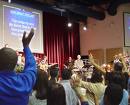Physical Address
304 North Cardinal St.
Dorchester Center, MA 02124
Physical Address
304 North Cardinal St.
Dorchester Center, MA 02124
 I recall sitting in a large church meeting that was once again, dismissed without an altar call. Having attended the church for a while, I was fairly confident there were more than a few new faces in attendance. Most of us would have felt the same frustration, I’m sure. In my own 10-year experience ministering, I would always give an altar call for salvation after the message. Actually, I would also give an altar call to the sick for healing as well.
I recall sitting in a large church meeting that was once again, dismissed without an altar call. Having attended the church for a while, I was fairly confident there were more than a few new faces in attendance. Most of us would have felt the same frustration, I’m sure. In my own 10-year experience ministering, I would always give an altar call for salvation after the message. Actually, I would also give an altar call to the sick for healing as well.
In searching for a Church’s practical path to being a Healing Church, some things are important. The reason we have (or should have) a salvation altar call every service is that we don’t want people to leave without something Jesus already paid for. It’s the same with healing. Jesus already paid for it, in the same breath as the forgiveness of sins,
(Psalm 103:2-3) Praise the LORD, O my soul, and forget not all his benefits- who forgives all your sins and heals all your diseases,
I’m not sure then, why we would ever close a service without ministering to the sick. Ministry to the sick should also be a regular part of a church’s services because of the scale of the need. I wonder if pastors realize that every week, over 50% of their congregations are dealing with sicknesses, diseases and addictions. Don’t believe me? Take a poll at your church and ask for a show of hands for anyone who has a disease of any sort. Whenever I’ve seen this done, in church after church, it has always been the majority of the congregation.
Why sidestep that chronic condition that occupies almost every thought of that sick person, why ignore the chronic pain that your parishioner is living with day after day? We treat them instead to another sermon on how to be nice to their neighbors-just like the one last week on joy. Have you ever had pain that is with you ALL the time? I have, and such sermons irritated me, to get real about it. You know what brought me joy? Being healed by God, thank you very much. A bit like this guy in Acts 3,
6 Then Peter said, “Silver or gold I do not have, but what I have I give you. In the name of Jesus Christ of Nazareth, walk.” 7 Taking him by the right hand, he helped him up, and instantly the man’s feet and ankles became strong. 8 He jumped to his feet and began to walk. Then he went with them into the temple courts, walking and jumping, and praising God.
Healing then, has become the elephant in the room no one wants to talk about. The problem though, is that if Christianity is separated from the miraculous and becomes merely “talk without-power”, then good luck in evangelizing the world. It just turns into a ‘show me your book and I’ll show you mine’ experience. What was it Paul said in 1 Thessalonians 1:4-5,
4 For we know, brothers loved by God, that he has chosen you, 5 because our gospel came to you not simply with words, but also with power, with the Holy Spirit and with deep conviction.
Some may say that the power of the Holy Spirit does not mean the miraculous, but I would look at Galatians 3:5 where Paul asks,
Does God give you his Spirit and work miracles among you because you observe the law, or because you believe what you heard?
This is what the Holy Spirit does when the full gospel is preached and He visits us. He does miracles and heals. I’ve been encouraged by the ministry of Heidi Baker in Mozambique, who preaches the gospel with signs following (irismin.org). That is the only possible method of outreach in the Muslim and animist areas where she has seen mass conversions.
The beginning of a church’s path to becoming a healing church is first to resolve that this where you want to be. I believe if the commitment is not there from the top downwards, it’s very hard going for those workers who believe. God works through His leadership. A church must be ready to preach healing, to teach it, to pray for it, to hunger after spiritual gifts and develop compassion for the sick. The latter is the overriding motivation, not participation because you want to be somebody and have a mighty, recognized ministry.
Once the commitment is there, then the hard work of building a healing church can begin. This is what I shall address in my next posts. Are you a member of such a church and if so, what are your essential ingredients of a healing church?